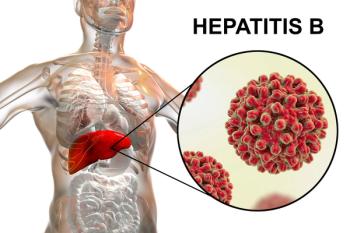
Researchers Identify Possible Liver Cancer Immunotherapy
A study in mice has found that a combination immunotherapy slowed tumor growth and activated anti-tumor immune response.
Researchers have discovered a specific combination immunotherapy that shows promise in treating patients with liver cancer.
The therapy involves a tumor-suppressing lipid molecule — nanoliposome C6-ceramide (LipC6) — and an antibody for cytotoxic T-lymphocyte antigen 4 (CTLA4). When used together, the two slowed tumor growth and enhanced the strength of tumor-attacking T cells, the University of Missouri, Columbia, said in a
The FDA has approved one antibody that targets CTLA4. Bristol Myers Squibb’s Yervoy (ipilimumab) is available as both a monotherapy and in combination to treat a variety of cancers, including melanoma, renal cell carcinoma, colorectal cancer, non-small-cell lung cancer, and esophageal cancer.
“Our analysis revealed the combination therapy significantly extended the life span of tumor-bearing mice compared with the mice with a single type of therapy or no therapy at all,” said co-principal investigator Guangfu Li, Ph.D., DVM, associate professor in the Department of Surgery and Department of Molecular Microbiology and Immunology at MU.
Li and colleagues published the research in the journal
Li said the findings are especially promising given the current lack of effective therapies to treat patients with liver cancer, the third-leading cause of cancer-related deaths in the United States. For patients diagnosed with liver cancer, the average five-year survival rate of all stages is 20%, according to the American Cancer Society.
Managed Healthcare Executive® talked with Li about the combo treatment and its commercial application.
MHE: What is the significance of this research?
Li: What is particularly notable is that we have now demonstrated that LipC6 treatment significantly improves the ability of anti-CTLA-4 antibodies to suppress liver cancer. Anti-CTLA4 antibody in combination with anti-PD-1/PD-L1 antibody was approved by the FDA to use in human patients with liver cancer; LipC6 as monotherapy was also approved by the FDA to use in human clinical trials for solid tumors including liver cancer.
In our study, we have demonstrated the therapeutic effect of their combination in a mouse liver-cancer model. Thus, their combination could be quickly approved by the FDA for the human clinical trial. We are now working together with our collaborators on the application of clinical trials of this combinational therapy in human patients with liver cancer.
MHE: What is involved in bringing the treatment to market?
Li: We have submitted a patent application for this combinational treatment against cancer.
Staveley O-Carroll, M.D., Ph.D., professor in the Department of Surgery at MU and Mark Kester, Ph.D., director of the nanoSTAR Institute and a professor in the Department of Pharmacology, Biomedical Engineering, Molecular Physiology & Biophysics at the University of Virginia, and I have worked closely together since we were colleagues at Penn State College of Medicine.
Our initial high-impact paper showing these ceramide nanoliposomal particles were effective against hepatocellular cancer was published in GUT in 2012. We subsequently have combined this technology with immunotherapy in work that was funded by a multi-PI R01 from the National Cancer Institute and featured in Gastroenterology (2018) and FASEB (2022).
The three of us have patented the combination of this technology with immunotherapy and now, more specifically, CTLA4 therapy.
A company,
Based on our provocative and powerful data, we are working with Pendreabio to open a phase 2 trial combining Ceraxa with anti CTLA4 therapy for liver cancer. We are also submitting an academic/industry partnership grant to the National Institutes of Health to fund this clinical trial, in addition to a VA Merit Award to fund a similar trial for our veterans.
MHE: Have other similar studies been conducted on the combination treatment, or is this groundbreaking research?
Li: To my knowledge, no other similar studies have been conducted.
Newsletter
Get the latest industry news, event updates, and more from Managed healthcare Executive.























